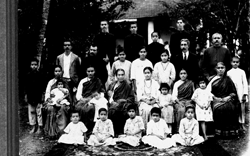
On a quiet hill in Goa, called Mont de Guirrem, the Capuchins had their Monastery. Fr. Joseph, the eldest son of my father's sister who was a Capuchin friar, told me that on one side of their monastery the landowners lived, and one among them was a Pais family. On the other side of the road lived the people who tilled the fields for the land owner families. It is said, that there was a custom, perhaps handed down by the Portuguese rulers, that during the rite of baptism, the baptized took the surname of their Godfathers. The landowners and the tillers had the same surnames, as the Godfathers of the landowners were some of the Portuguese settlers and those of the tillers, were the baptized Landowners who gave their surnames to the Indian converts. Before conversion, their family names were Prabhu, Kamat, Naik, Pai etc. The Pais household was a Prabhu family before their conversion to Catholicism. Pais in Portuguese means ĎCountryí. My story starts with a family, headed by a person named Cojma, Portuguese version of Cosmos. Nothing is known about him, except that my cousin, Fr. Joseph o. f. m. Cap, culled his name out of the birth and death registers of the Mont de Guirrem monastery. He was preparing data for his father, Marian Salvadore Pais, who wanted to prepare the Pais Genealogy. Cojma (Cosmos) might have had many children, but two of his sons, Salu, and Domingo, decided to move out to Mangalore about 450 years ago. There might have been a teary send off, with their mother packing pickles, dry fish and masalas for their use in Mangalore, and some food for the voyage on the Patmar a sea faring boat. They might have sailed from the Marmagoa Harbor, with many other Goan men, who might have had surnames like DíSouza, Fernandes, Gonsalves, Tellis, Saldana, Castelino, Sequeira etc.
The place where these two brothers lived in Mangalore is not known, but I thought they might have landed in Coondapur. While many of their friends remained there, others might have gone southwards looking for jobs or to start some business of their own. They may have settled in different villages and towns.
Salu, the older boy of Cojma, might have got married first, probably to a girl from a Shetty family in Mangalore, as her name is recorded in the genealogy, as Zoblu Shet. Domingo married later and his wifeís name is not recorded anywhere. Probably, Salu was able to own some land with the help of his father in law. From the name Zoblu, his wife might have embraced
Catholicism, the religion of her husband, or she might have been the daughter of some convert, who did not change his surname.
Salu and Zoblu might have been a very loving couple, as they had nine children. The eldest was a girl called Anna whom they got married to one Morian Coelho, who might have been the son of a man who had traveled with the father from Goa. Jackie was
born after Anna and as a boy must have worked on the land, helping his father tilling it, and looking after the farm animals. He had four younger brothers, Pascu, Juze Mingel, John, and Simon.
The sisters younger to Jackie were Modthes, (Martha) who married Kaithan Gosal (Gonsalves). Modthes was the girl in between Pascu and Juze Mingel . The latter married Anna Costa, while the former might have died unmarried.
John came after Juze Mingel and between him and his younger brother Simon was their sister Mercine who was married to Juze
Coelho. John married a local girl who was called Regina Mudarth. Many DíSouza families of Mangalore came from the Mudarth clan. Ignatia Coelho was the wife of Simon. The last girl Gratia married Domingo Soza. The Soza family is also known as DíSouza. From the surnames, we can surmise that many of these families might have originated in Goa, and some in Mangalore. According
to the Portuguese pronunciation, the last vowels were not pronounced, thus Coelho, was Coel, Lobo was Lob, Soza was Soz, Fernandes was Fernand, Pereira was Pereir etc. Though Anna and Mercine were married to boys from Coel family, we do not know if the two sons in law were brothers. May be the wife of Simon, Ignatia might have been their sister. I am led to believe that
marrying within closely knit families helped the land owning families from de-fragmenting their lands. The land also helped their family bonds. Agnes, the sister of Fr. Joseph, who gave me the genealogy was the great grand daughter of Juze Mingel.
Domingo the brother of Salu had eight children, four boys, and four girls. The boys were Niku, (Nicholas) who married Regina Mathias. Juze was married to Mercy Rego. Intru (a rare name) married Mercy Soz, and Anthony who might have died young or remained a bachelor. Since Domingo was the first generation Goan to have migrated to Mangalore whether the marriages of his children took place in Goa or Mangalore is a matter left to conjecture

Descendants of Juze Pais, great grandson of Salu Pais in 1926